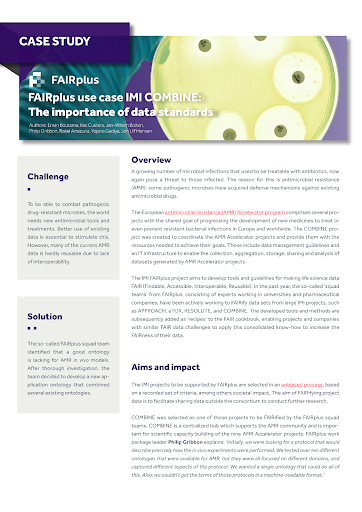COMBINE case study: The importance of data standards
FAIRplus squad teams are working on developing a new application ontology to make the COMBINE data more Findable, Accessible, Interoperable and Reusable (FAIR).

A growing number of microbial infections that were treatable with antibiotics are now posing a threat to those infected. The reason for this is antimicrobial resistance
(AMR): some pathogenic microbes have acquired defence mechanisms against existing
antimicrobial drugs.
The IMI COMBINE project is part of IMI’s Antimicrobial Resistance (AMR) Accelerator programme. COMBINE is a centralised hub that supports the AMR community and is important for the scientific capacity building of AMR Accelerator projects. The project’s aim is to improve the animal models used in AMR research and develop improved tools to reliably translate results in animals into results in humans.
To be able to combat pathogenic drug-resistant microbes, we need better use of existing data to stimulate the development of new antimicrobial tools and treatments. However, the majority of the current AMR data is hardly reusable due to a lack of interoperability.
This case study details the FAIRplus squad teams’ work on increasing AMR data’s reusability and interoperability by developing a new application ontology that combined several existing ontologies.
Read/download/share the APPROACH case study, openly available on Zenodo: https://zenodo.org/record/6685799#.YswYtezMLVY
